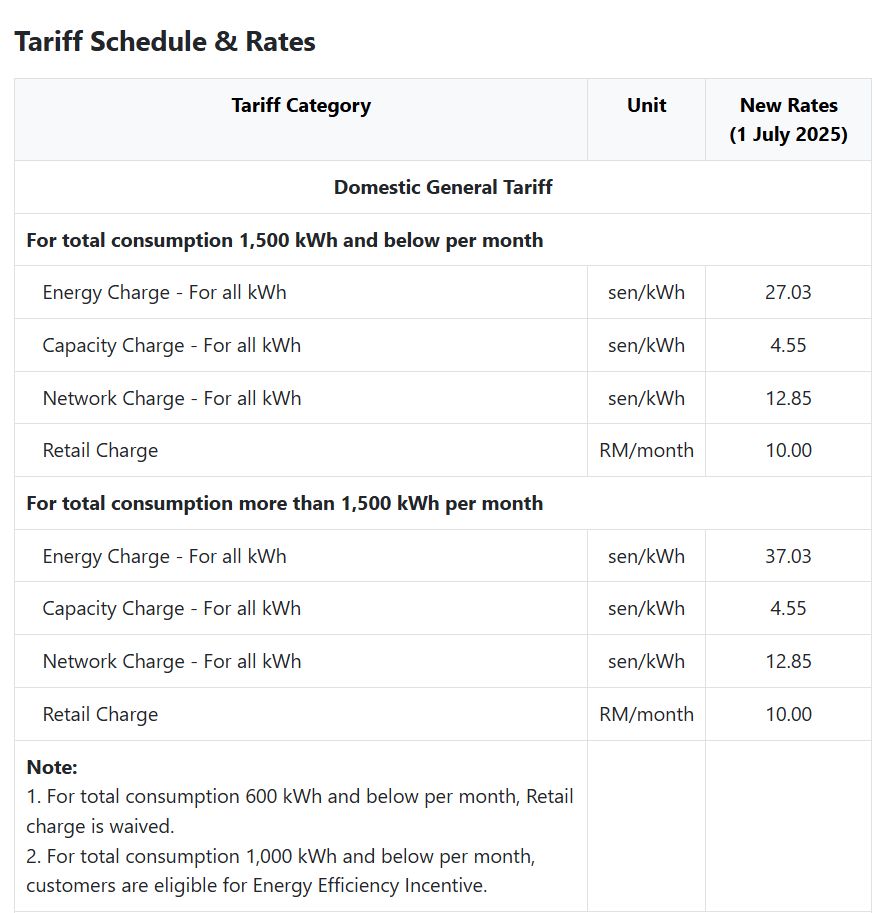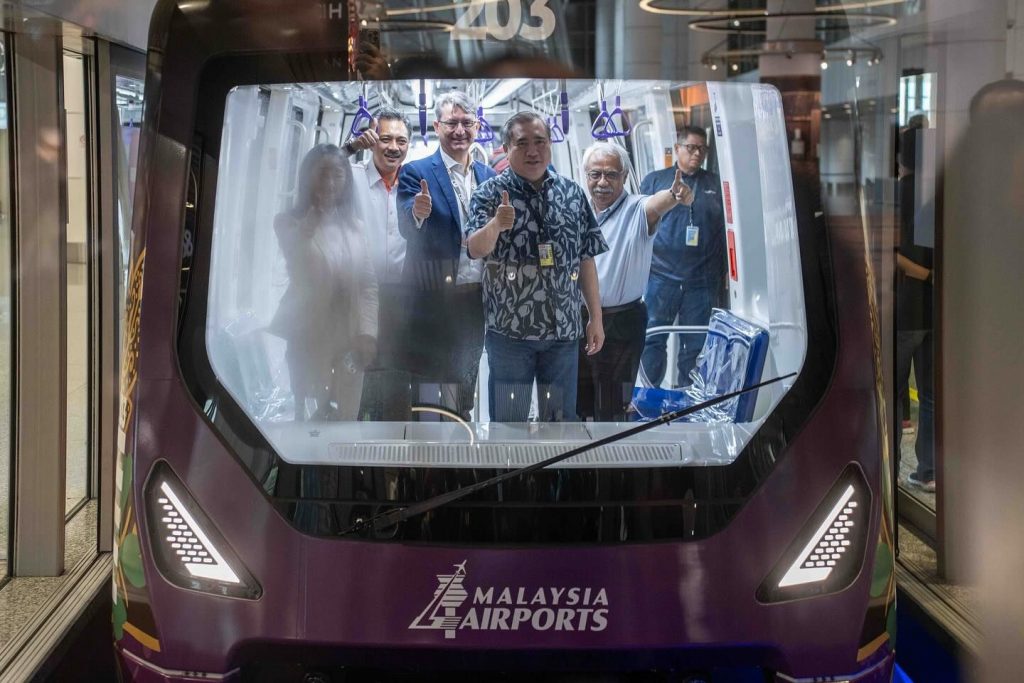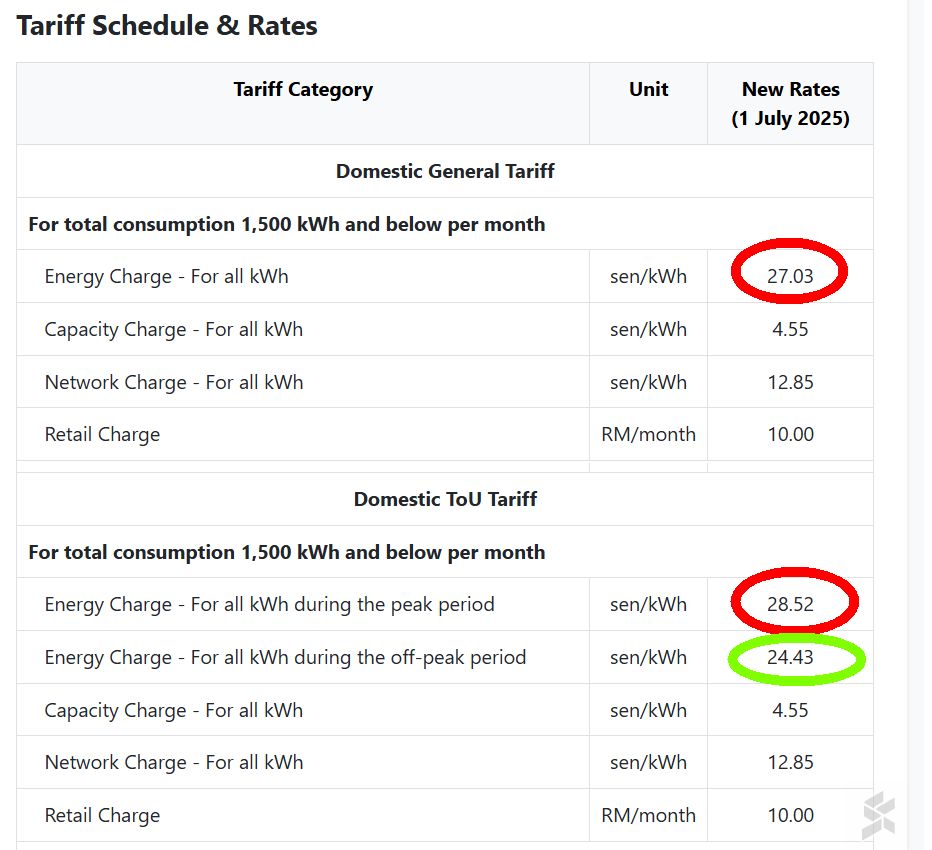Starting 1st July 2025, Tenaga Nasional Berhad (TNB) account holders in Peninsular Malaysia will see changes to their electricity bills. This isn’t just an electricity tariff update but a complete overhaul of how electricity is charged to consumers.
According to the Energy Commission (ST), the new electricity tariff structure changes will provide a more equitable and progressive electricity tariff for over 23.6 million domestic electricity users in Peninsular Malaysia.
Here’s what you need to know and how you can make the most of the new structure.
What’s new and why the electricity tariff structure is changing?
Under Regulatory Period 4 (RP4) of the Incentive-Based Regulation (IBR), the Energy Commission has approved a new electricity tariff structure that will run from 1st July 2025 to 31st December 2027. This revamp is meant to reflect the true cost of electricity supply from generation to distribution, while at the same time encouraging efficient use of electricity through incentives and rebates.
Rather than relying on existing (200-300kWh) tariff blocks, the new structure breaks down your electricity bill by components and it adapts quicker to fuel price fluctuations. In addition, domestic (home) users can finally sign up for a Time-of-Use (ToU) scheme which offers lower rates during off-peak hours which is great for EV owners who often charge their cars overnight at home.
New TNB Electricity Tariff Structure and Rates effective 1st July 2025
Under the existing structure, TNB offers 5-tier pricing for domestic users which ranges from 21.80 sen/kWh (1-200kWh) to 57.10 sen/kWh (901kWh and above).
With the new tariff structure, the charges are now broken down to 5 key components – Energy, Automatic Fuel Adjustment (AFA), Capacity, Network and Retail.
For retail, the domestic tariff is now streamlined to 27.03 sen/kWh for monthly usage up to 1500kWh or 37.03 sen/kWh for usage above 1500kWh. Besides energy, the other set charges are:
- Capacity charge – 4.55 sen per kWh
- Network charge – 12.85 sen per kWh
- Retail charge – RM10 per month
So with the components combined, consumers (within 1500kWh per month) would pay an average of 44.5 sen per kWh for electricity. That’s before any applicable tax, AFA, rebates and incentives.
The current Imbalance Cost Pass‑Through (ICPT) mechanism, which adjusts costs based on fuel and other generation-related expenses, will be replaced by a new Automatic Fuel Adjustment (AFA) mechanism. At the time of writing, TNB has yet to reveal the AFA rate for July 2025.
Unlike the ICPT which is updated every 6 months, the AFA will be reviewed and updated every month which is said to be fairer to consumers. The AFA may be reflected as a rebate or surcharge per kWh, depending on the latest fuel prices.
How is your future TNB bill calculated under the new tariff?
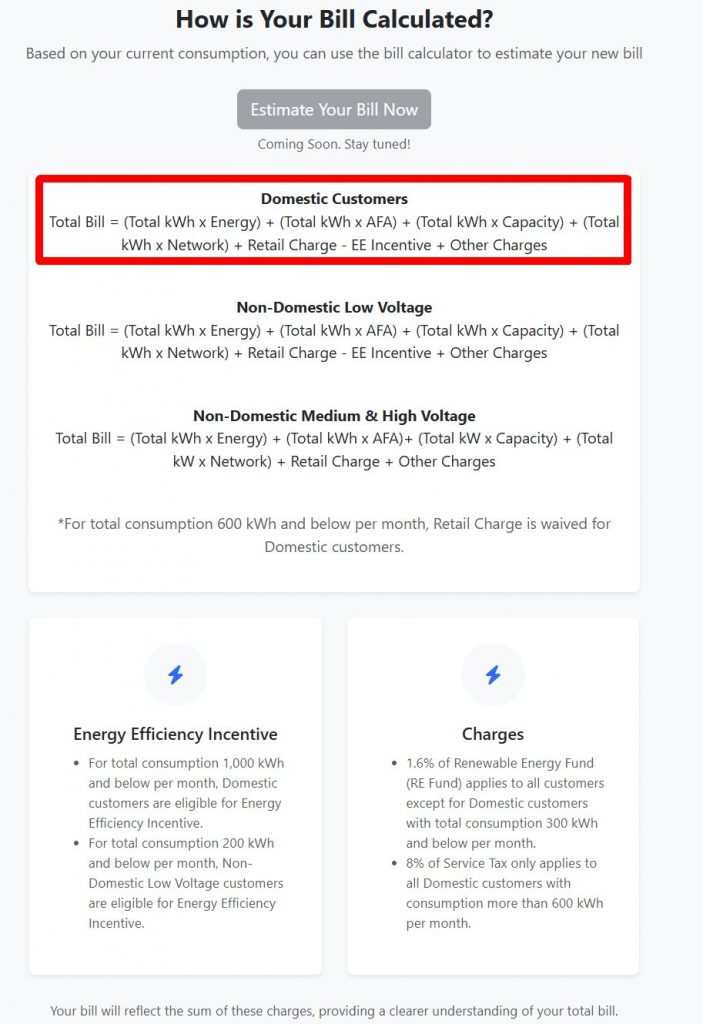
At the moment, TNB is still working on a Bill calculator which is expected to go live by Monday, 23rd June 2025.
For Domestic Users, the total bill will consists of:
- Energy Charge (per kWh)
- AFA (per kWh)
- Capacity Charge (per kWh)
- Network Charge (per kWh)
- Retail Charge (per month)
- Energy Efficiency Incentive
- Other Charges
To encourage efficient use of electricity, consumers can enjoy extra rebates and waivers with the following:
- Waiver of RM10/month retail charge for usage of 600kWh and below
- Up to 25 sen/kWh rebate for usage of 1000kWh and below under Energy Efficient Incentive

Above is a sample bill under the new tariff structure from the Energy Commission.
Will my TNB Electricity bill increase starting July 2025?
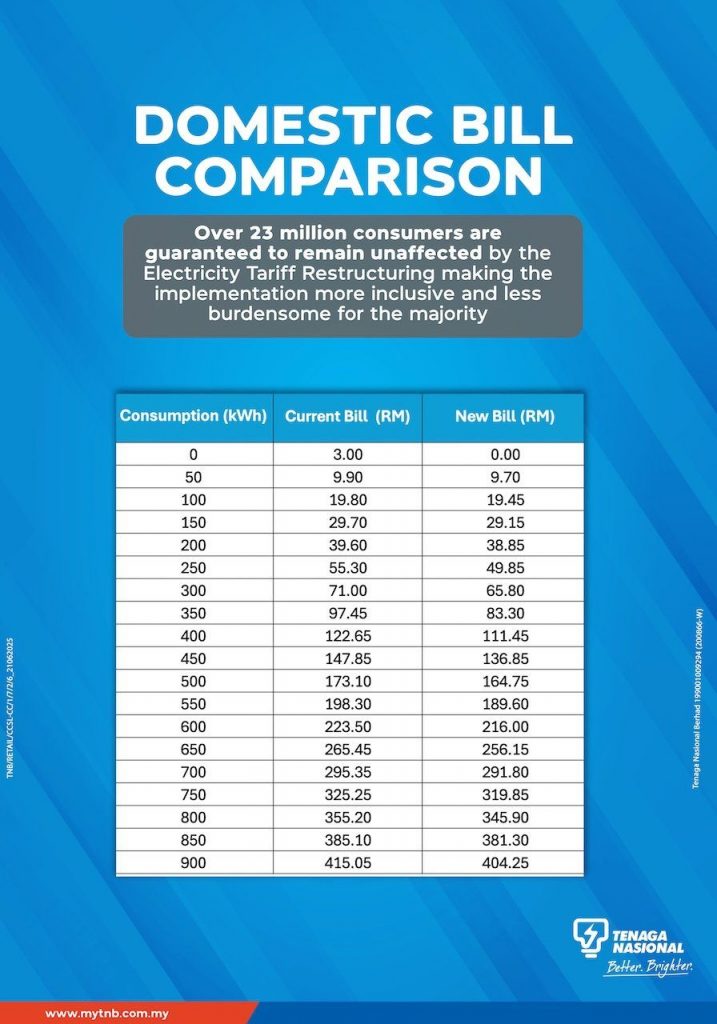
According to TNB, 23 million consumers are guaranteed to remain unaffected by the Electricity Tariff Restructuring. In the provided bill comparison shown above, consumers who use 900kWh or less per month will likely see a slight reduction of their monthly bills.
However, do take note that the estimation is subject to external variables such as the Automatic Fuel Adjustment (AFA) which is affected by global fuel prices.
Time-to-Use (ToU) Tariff – Cheaper electricity during off-peak hours
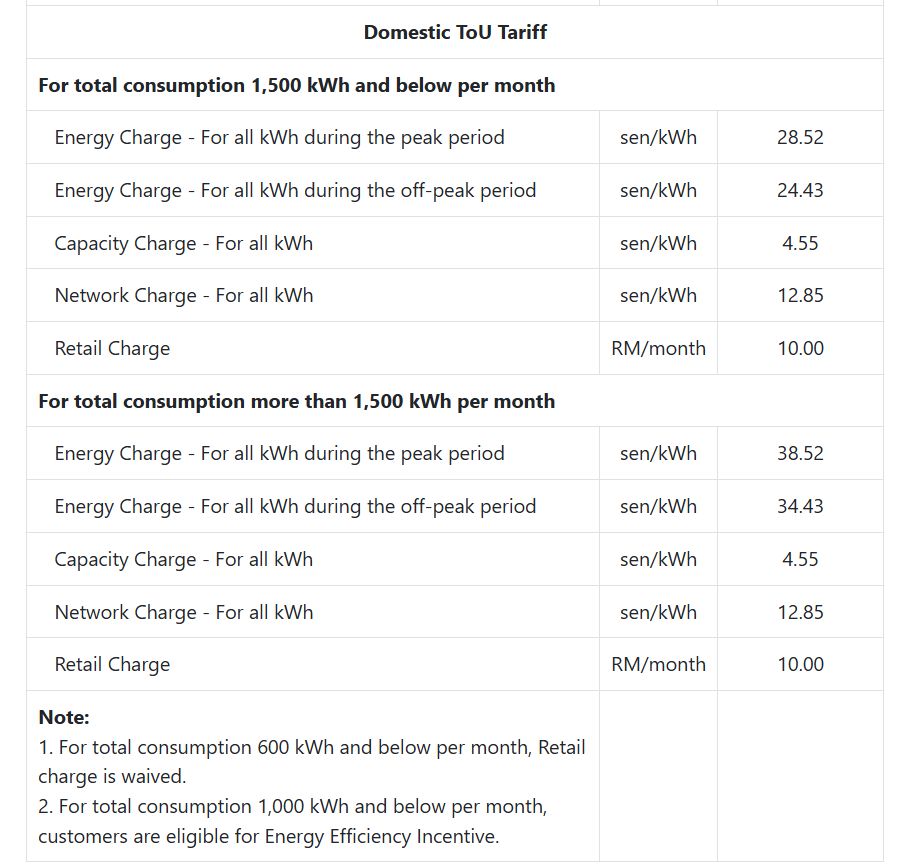
TNB has also revealed the Time of Use (ToU) scheme which allows customers to use electricity more efficiently while enjoying lower rates during off-peak hours. Initially offered to Medium and High Voltage Non-Domestic customers, the ToU scheme will be available for Domestic and Non-Domestic Low Voltage customers starting 1st July 2025.
The ToU scheme has two time zones as listed below:
Monday to Friday
- Peak: 2:00pm to 10:00pm (8 hours)
- Off-Peak: 10:00pm to 2:00pm (16 hours)
Saturday and Sunday
- Off-peak: All-day (24 hours)
With the ToU scheme, home owners can enjoy a lower off-peak rate of 24.43 sen/kWh for consumption up to 1500kWh or 34.43 sen/kWh for consumption above 1500kWh. That translates to savings of 2.6 sen per kWh for off-peak usage.
However, do note that the peak rate is slightly more expensive than the normal scheme at 28.52 sen/kWh for consumption up to 1500kWh or 38.52 sen/kWh for consumption above 1500kWh. That’s an increase of 1.49 sen/kWh compared to the all-day rate on the normal rate.
The ToU scheme is optional and is offered only for customers with Smart Meter and Current Transformer (CT) meter or Remote Meter Reading (RMR) meter. To switch over to the ToU scheme, TNB says customers can visit the nearest Kedai Tenaga.
Rebates and Social Assistance
As revealed by ST, they are still maintaining incentives to help the needy, vulnerable and specific sectors. This includes RM40/month rebate for the hardcore poor under e-Kasih and 10% rebate for the following sectors:
- Places of worship
- Welfare centres and organisations (etc. Orphanage, Elderly Home, Home for the Blind, etc)
- All government and private institutions which are fully or partly funded by the Government
[ SOURCE, IMAGE SOURCE ]
